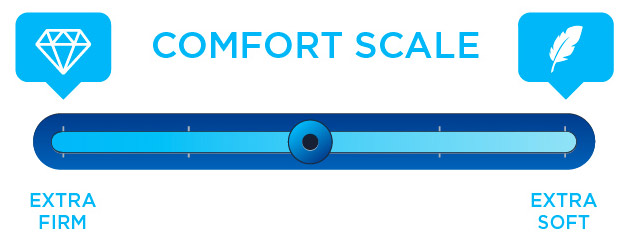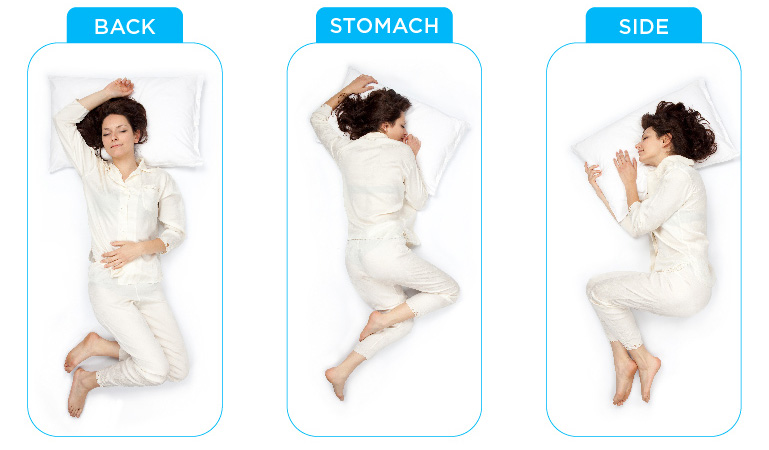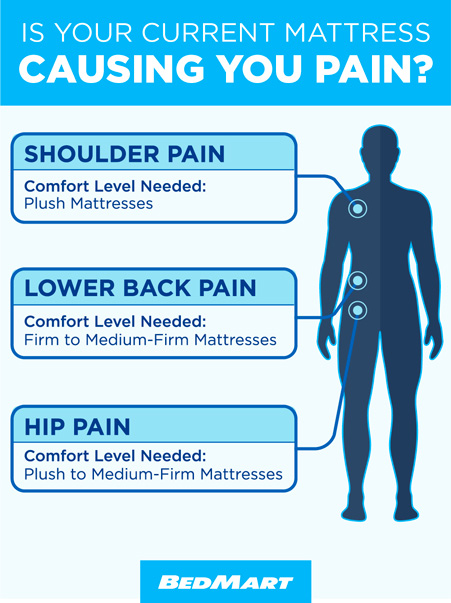Buying Guide
the Difference between plush, medium, and firm mattresses
Your bed is the piece of furniture you probably use the most in your home. Hours are spent on it each and every night, not to mention any midday lounging time. If you’re a student, your bed may be your prime studying spot, or if you work from home, it may even be your office. Being comfortable in bed is important, so you should consider all of the available options when you’re buying a new mattress, which are typically replaced every five to seven years.

Mattress comforts are extremely subjective and a variety of terms will be used to describe the firmness level of a mattress. There isn’t a universal list of specifications to determine which word should be used to describe the feel of a mattress. And, comfort levels will be impacted by the type of construction, components used, and manufacturer. This makes a lot of people wonder if a plush, medium, or firm mattress will be right for them.
To figure this out, there are a number of questions to ask yourself when deciding between plush vs. medium vs. firm mattresses.
- What is the difference between a plush and firm mattress?
- What is the difference between a medium and plush mattress?
- What is the difference between a firm and medium mattress?
- What position do you normally sleep in at night?
- Is your current mattress causing you pain?
- What mattress do you feel most comfortable on?
- What type of mattress is best for you?
This article answers some basic questions to help you decide which mattress best suits your needs.
How to Choose Your Mattress Firmness
As you shop for a new bed, you will need to decide if you need a plush vs. a firm mattress. The mattress firmness levels are comfort terms used to communicate how something feels; it does not indicate the quality of support a mattress will provide you. Determining the right support for your body, size, and shape is an important first step. A comfortable mattress will help you fall asleep quicker, while the support system will keep you from tossing and turning or waking up in pain.

Your body composition plays a huge role in how a mattress will feel and perform for you. Unfortunately, it’s not as simple as knowing that you like a soft or firm mattress. You need to consider the support level your body needs and how the comfort level will play a role in improving your quality of sleep.
Plush vs. Firm Mattress
A plush mattress has a softer feel. This is achieved by adding layers of pressure-relieving materials on top of the support core or by varying the thickness and density of the padding. These layers contour to your hips and shoulders, cradling your body throughout the night. Sleepers often describe this feel as if they’re “sleeping in” or getting hugged by their bed. Plush mattresses are a great option for side sleepers.
On the opposite side of the spectrum, a firm mattress has a harder surface. Sleepers often describe firm beds as “hard as a rock” with a “sleeping on top of the bed” sensation. This is not to say they aren’t comfortable; firm beds just don’t offer much pressure point relief. You won’t sink into a firm mattress, and the lack of comfort layers may help you sleep cooler. Firm mattresses are ideal for people who sleep on their back or stomach.
Medium vs. Plush Mattress
If your preference lands somewhere in the middle, you should consider a medium vs. a plush mattress. There are slight similarities between the two. However, a medium feeling mattress is a popular option because it isn’t too firm or too soft. You may see terms like “cushion firm” or “luxury firm” used interchangeably. When you’re in bed, you won’t feel any sinking; rather, you’ll feel the support pushback ever so slightly underneath a variety of layers designed for pressure point pain relief. Usually, medium mattresses are designed with a mix of comfort layers and support technologies but with less loft than the plush comfort level. This is a well-balanced feel, making it a great option for all types of sleepers. While we do not believe in universal comfort, a medium mattress would be the closest thing to it.
If you start to feel your shoulders, arms, or hips tingle while sleeping on a medium mattress, you should try something softer, like a plush mattress. The extra layers of comfort offer more contouring and give when you lay down. The soft layers in a plush mattress usually work best for petite individuals, curvier figures, and aging adults with less “meat on their bones.”
Medium vs. Firm Mattress
Choosing between medium vs. firm mattresses depends on how much firmness you desire in a mattress. A medium mattress will gently conform to your body with its comfort layers, while a firm mattress focuses on the support and durability. Firm mattresses are also less prone to sagging but can cut off your pressure points, making you toss and turn throughout the night. Alternatively a medium-firm mattress may be the hot ticket for you as they usually have just enough cushion to take the edge off.
What position do you normally sleep in at night?

Before mattress shopping, take special note as to what position you sleep in most often. Do a little bit of research on yourself when choosing a mattress. Make sure to note what position you naturally go to when you fall asleep and what position you find yourself waking up in. Waking up in a different position means that is probably the position you spend most of your sleeping hours in; therefore, it is also the position you’re in the bulk of the night. This will determine what firmness you will need in a mattress.
If you are a side sleeper, you should look into purchasing a plush or medium mattress. You will need the extra comfort layers to provide pressure relief for your hips and shoulders. Generally, people with a curvier figure need the added cushion found in plush mattresses.
If you are a back sleeper, a medium-firm mattress will be a good fit. Medium-firm mattresses are designed to provide the perfect balance between contouring comfort and pushback support.
If you are a stomach sleeper, a firm mattress is your best bet. A firm mattress provides you with the solid surface you’ll need to reduce back pain caused from spinal compression often associated with this sleep position.
Is your current mattress causing you pain?
If you are currently suffering from neck or back pain, make note of when you’re experiencing the pain the most. Is your pain worse at night or in the morning? If your pain is worse when you wake up, your mattress is likely the cause. Getting a new mattress with the proper support and comfort for your body will greatly alleviate this for you. Certain mattress features can provide relief and additional support depending on where your pain is.

If you are suffering from lower back pain, it is recommended that you find a mattress that provides solid support, with just enough cushion. This is usually found in a medium or medium-firm mattress.
If you are suffering from shoulder or hip pain, find a mattress that provides a happy combination of comfort layers and support features. Look for a plush, medium, or medium-soft mattress to help provide pressure relief.
If you are suffering from restless leg syndrome, nighttime heartburn, or GERD, you may want to look into an adjustable mattress base in addition to a new mattress. Sleeping on an incline helps to alleviate these nasty pains.
As always, we recommend you consult a physician if you have any further issues or questions concerning choosing a mattress and your health.
What mattress do you feel most comfortable on?
This question may seem like a very obvious one to consider when choosing a mattress, but it’s more complicated than you think. Most people go years before getting a new mattress, and during this time, your body will inevitably change with age. For this reason, it’s important to test mattresses in a store to find one that fits your unique needs. This can save you time and hassle in the long run.
When testing a mattress, lie in the position you most often sleep in for several minutes. It takes your body time to adjust to a position, and pressure points will not become apparent to you unless you take the time to lie down for a while. Once you’ve tested the mattress for several minutes, pay attention to how your body feels.
- Do you feel like you need to move around to get comfortable?
- Does any part of your body feel stress or pressure?
- If lying on your back, are your feet crossed?
If you answer yes to any of these questions, you haven’t found your perfect mattress.
Here’s the thing about finding your perfect mattress:
Most people choose their mattress based on how they feel after a few minutes trying it out in a store. The fundamental problem with this is that when you’re awake, your muscles aren’t fully relaxed. And when you sleep, the muscles in your body relax completely, making proper support even more important for spinal alignment and pressure relief. If you’re sleeping on the wrong mattress, poor postural support will result in morning aches and pains and can contribute to bigger health issues over time.
